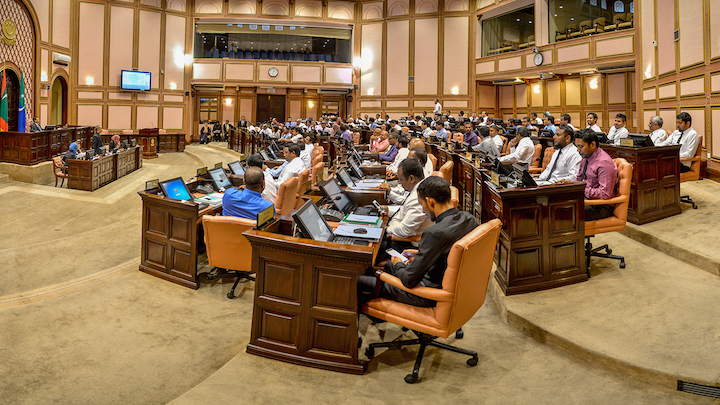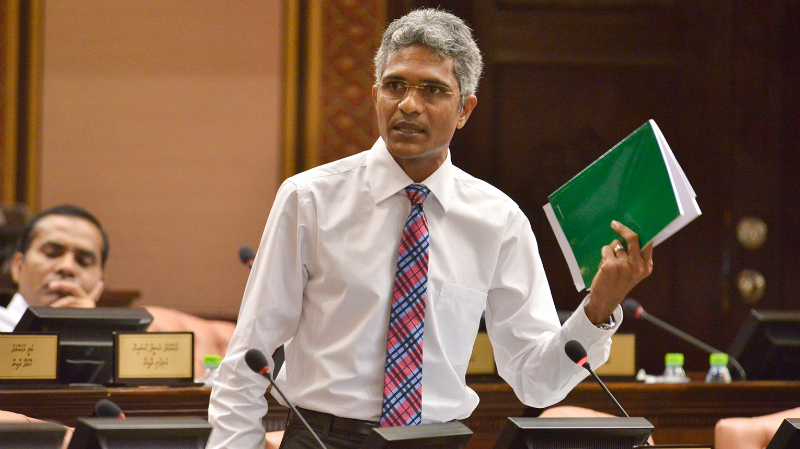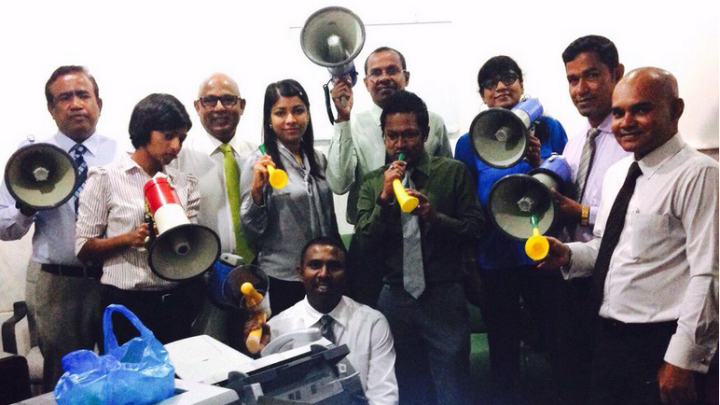Pro-government MPs have accused influential countries in the Commonwealth of “bullying” the Maldives and interfering in domestic affairs in a parliamentary debate on quitting the inter-governmental body. Opposition MPs warned that the current administration’s foreign policy would isolate the country.
President Abdulla Yameen had sought parliament’s counsel on the country’s membership of the Commonwealth following lobbying efforts for an assessment of Maldives’ alleged violations of the organisation’s principles with the imprisonment of opposition politicians, including former President Mohamed Nasheed.
In a letter to the speaker – read out at today’s sitting – the president noted that the cabinet had suggested a review of the Maldives’ role in the Commonwealth and requested the parliament’s advice on the issue.
In the ensuing debate, ruling Progressive Party of Maldives (PPM) MP Ahmed Nihan said some Commonwealth members are trying to place restrictions on the Maldives and harm the country’s economy and tourism industry through the Commonwealth Ministerial Action Group’s (CMAG).
The Maldives’ treatment in the Commonwealth was akin to “the weakest or quietest kid in the class being bullied by the biggest group or kid,” he said.
If the government decides to leave the Commonwealth, the PPM parliamentary group leader said he would fully back the decision.
PPM MP Riyaz Rasheed meanwhile called on MPs to propose immediately leaving the Commonwealth to the government.
The Commonwealth was demanding opposition leader Nasheed’s release from prison, Riyaz claimed, which was contrary to separation of powers and the constitution adopted in 2008 with the organisation’s assistance.
“[The Commonwealth] does not want Islam in the Maldives. They want to spread false religions here, they want to build temples here, they want to elect a leader here who can carry out their agenda,” he said.
The Maldives should not be “afraid” of the Commonwealth as unlike India and China the organisation has not provided significant aid to the country, he continued.
Earlier this month, foreign minister Dunya Maumoon said the Maldives “will seriously consider its membership at the Commonwealth” if it is placed on the agenda of the Commonwealth’s human rights and democracy arm for a second time in four years.
The Maldives was placed on the CMAG’s agenda in 2012 “on an unfair basis, based on false allegations, and the country’s economy and democratic governance suffered significantly as a result,” Dunya said.
In mid-June, Canada had called on CMAG to “urgently put the deteriorating situation in the Maldives on its formal agenda,” prompting Dunya to accuse the Canadian government of hypocrisy. “Canada should address the cultural genocide it is alleged to have committed against native Canadians before trying to teach other nations about values of democratic principles and human rights,” she said.
Echoing Dunya’s criticism during today’s debate, ruling party MPs said the countries pushing for action against Maldives has committed serious crimes, such as “electoral fraud” and “cultural genocide.”
Others also called on the Commonwealth to apologise to the Maldives for taking action against in the wake of former President Nasheed’s controversial resignation in February 2012.
The Maldives was placed on the CMAG agenda from March 2012 to March 2013 after Nasheed resigned amidst a police and military mutiny. He later alleged he had been ousted in a coup d’état, but a Commonwealth-backed inquiry found the transfer of power to be constitutional.
Main opposition Maldivian Democratic Party (MDP) MP Mariya Ahmed Didi advised the government to accept criticism from international partners “instead of saying we’re an independent country and becoming isolated from the world.”
The Maldives is dependent on imports and tourists and could not survive with an isolationist stance in an inter-connected world, she said.
MDP MP Eva Abdulla said Maldivian teachers, students, doctors, and athletes have received numerous opportunities through the Commonwealth in addition to assistance from member states.
The Commonwealth offers a platform for the Maldives to have its voice heard in the international arena, she said.
The Maldives could not achieve development and progress in isolation from the rest of the world, she continued, and foreign policy should be shaped accordingly.
“Temporary benefits or quarrels” should not dictate foreign policy or bilateral relations, Eva said.
The debate will continue tomorrow.
The CMAG in a recent meeting in London decided not to review the Maldives.
The president is authorized to determine. conduct and oversee the Maldives’ foreign policy according to the constitution.
 (0)Dislikes
(0)Dislikes (0)
(0)


